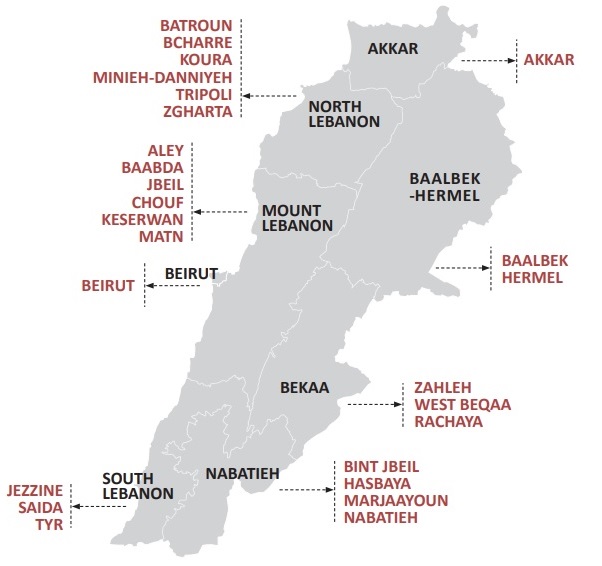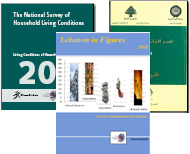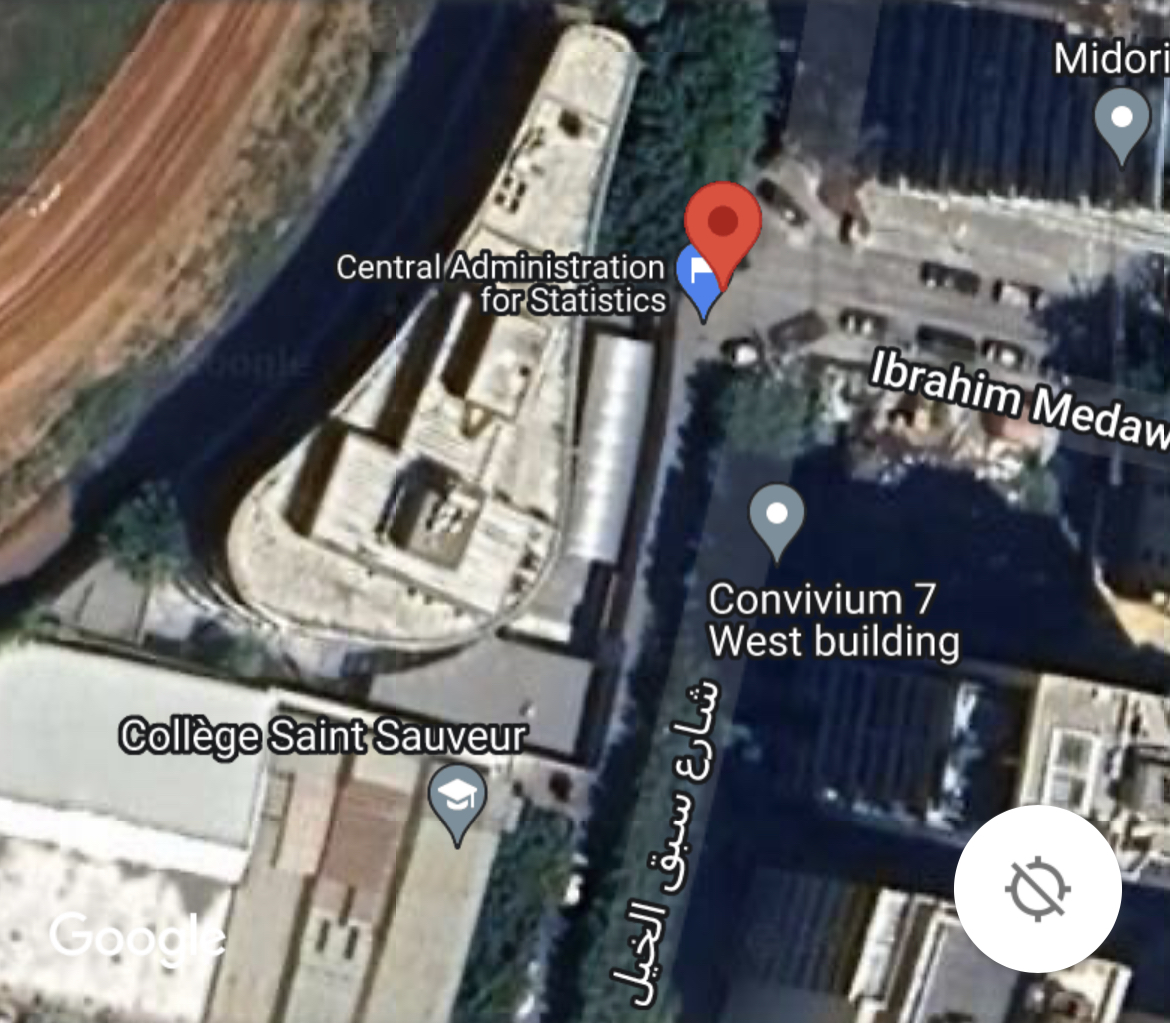Time Series
Administrative Info
Who's Online
We have 128 guests and no members online
Latest Publications
Sub-National Lebanon Multiple Indicator Cluster Survey (MICS 2023)
The Central Administration of Statistics publishes the results of the Sub-National Lebanon Multiple Indicator Cluster Survey (MICS 2023), implemented with the technical and financial support of UNICEF, including the Global MICS Team.
Sub-National_Lebanon_MICS_2023_Statistical-Snapshots
MICS6 Ch04 SR Sample coverage and characteristics of respondents-LB_EN
MICS6 Ch06 TM Thrive - Reproductive and maternal health-LB_EN
MICS6 Ch07 TC Thrive - Child health nutrition and development-LB_EN
MICS6 Ch09 PR Protected from violence and exploitation-LB_EN
MICS6 Ch10 WS Live in a safe and clean environment-LB_EN
Lebanon Follow-up Labour Force Survey January 2022
The Central Administration of Statistics (CAS) in Lebanon partnered with the International Labour Organization (ILO), to implement the follow-up Labour Force Survey (LFS) 2022. The follow-up LFS was conducted by CAS in January 2022 and both financial and technical assistance were provided by the ILO Regional Office for Arab States.
Full report (pdf File) (EN)
Annex Tables:
1.Demography 2022 (Excel File)
2.Education 2022 (Excel File)
3.Labour force 2022 (Excel File)
4.Health Insurance 2022 (Excel File)
5.Income 2022 (Excel File)
6.Intention to Immigration 2022 (Excel File)
Results Publishing event
Fact Sheet (EN)
Labour Force Survey Lebanon 2022 Slides (Revised) (EN)
General Director Speech (AR)
Multidimensional Poverty Index (MPI 2019) for Lebanon
The Central Administration for Statistics (CAS) together with the World Bank (WB) has developed the first Official Multidimensional Poverty Index (MPI 2019) for Lebanon using the nationally representative Labor Force and Housing Living Conditions Survey 2018-2019.
Full report (EN)
THE LIFE OF WOMEN AND MEN IN LEBANON: A STATISTICAL PORTRAIT BETWEEN 2004 AND 2019
THE LIFE OF WOMEN AND MEN IN LEBANON: A STATISTICAL PORTRAITBETWEEN 2004 AND 2019
DISTRICT STATISTICS based on the Labour Force and Household Living Conditions Survey 2018-2019
DISTRICT STATISTICS
(based on the Labour Force and Household Living Conditions Survey 2018-2019)
CAS presents district-based statistical reports, prepared in collaboration with the UNDP, covering the 26 Lebanese administrative districts. These reports are drawn from the findings of the LFHLCS carried out by CAS between 2018 and 2019, and provide a description of the socio-economic context in each district. The covered districts are illustrated in the map below.
إحصاءات الأقضية
(مسح القوى العاملة والاحوال المعيشية للأسر 2018-2019)
أطلقت إدارة الإحصاء المركزي بالشراكة مع برنامج الأمم المتحدة الإنمائي 26 تقريرًا إحصائيًا تغطي الأقضية اللبنانية
هذه التقارير تستند إلى نتائج مسح القوى العاملة والاحوال المعيشية للأسر التي قامت به إدارة الاحصاء المركزي بين عامي 2018 و2019، وتوفر هذه التقارير بيانات إحصائية لفهم السياق الاجتماعي والاقتصادي لهذه الأقضية
تم عرض كافة الاقضية اللبنانية في الخريطة أدناه
 |
Labour Force and Household Conditions Survey 2018-2019 (LFHLCS)
The Central Administration of Statistics (CAS) publishes the microdata files from the Labour Force and Household Conditions Survey 2018-2019 (LFHLCS) and it is now available for the public without any charge. It aims at enabling researchers to conduct their own analyses with the data. The LFHLCS was conducted by CAS between 2018 and 2019 and was entirely funded by the Delegation of the European Union to Lebanon, with the technical cooperation of the International Labour Organization (ILO), Regional Office for Arab States.
Labour Force and Household Conditions Survey 2018-2019 (LFHLCS) (Revised)Full Report
Documentation File Lebanon LFHLCS_2018-2019 (pdf file)
Data Dictionary_Lebanon_LFHLCS_2018-2019 (Excel file)
Detailed Report of the “Population and Housing Census in the Palestinian Camps and Gatherings in Lebanon
The Lebanese-Palestinian Dialogue Committee, TheLebanese Central Administration of Statistics (CAS)and the Palestinian Central Bureau of Statistics (PCBS) have released the Detailed Analytical Report of the “Population and Housing Census in the Palestinian Camps and Gatherings in Lebanon, 2017”.
The Report was prepared by a team of international Experts with the support of the working teams in both the Lebanese and Palestinian statistical offices. This comes following the release of the key finding report disseminated in early 2018.
This report provides a comprehensive snapshot on the conditions of Palestinian Refugees residing in the 12 Camps and 156 Gatherings in Lebanon. It offers a quantitative understanding of the demographic and socio-economic characteristics of the population and housing.
صدور تقريرالنتائج التفصيلية لتعداد السكان والمساكن للاجئين الفلسطينيين في لبنان
تطلق لجنة الحوار اللبناني الفلسطيني وإدارة الإحصاء المركزي اللبناني والجهاز المركزي للإحصاء الفلسطيني تقرير النتائج التحليلية لتعداد السكان والمساكن في المخيمات والتجمعات الفلسطينية في لبنان الذي تمّ تنفيذه ميدانياً في العام 2017 وصدر على اثره تقرير مختصر عن النتائج الأولية في مطلع العام 2018
أعد التقرير التحليلي فريق من الخبراء الدوليين بمساندة فرق عمل الجهازين الإحصائييْن اللبناني والفلسطيني . وهو يعرض بشكل موسع وتفصيلي المؤشرات والخصائص الأساسية الديموغرافية والاجتماعية والاقتصادية والبيئية المتعلقة باللاجئين الفلسطينيين المقيمين في الـمخيمات الـ12 والتجمعات الـ156 التي شملها التعداد





